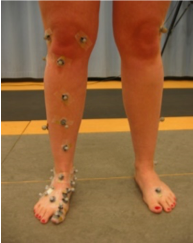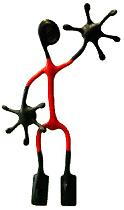Foot and ankle kinematic model to study instability
We are looking for a master student of Movement Science, Mechanical engineering or Physical Education with an interest in clinical mathematics. You will develop a computer foot and ankle kinematic model and assist in the assessment and analysis of balance measurements. Affinity with programming (MATLAB) is beneficial.

Background and aim
Kinematic computer models are used for motion assessment of foot and ankle segments. Several models are available and have been demonstrated to be useful in a clinical setting. In our lab, a larger project on neuro-muscular control of the ankle and clinical factors influencing ankle instability is on-going. Kinematic analysis is one of the parameters to evaluate balance performance of patients with an ankle instability. Therefore, the aim of this study is to develop an in-house foot and ankle kinematic computer model to be applied in on-going ankle balance measurements.
Your assignment
Your assignment is first, to familiarize yourself with available models and programme the foot and ankle kinematic computer model in MATLAB. Second, you will assist in gathering normative data from healthy participants regarding balance and gait by means of motion assessments using QUALYSIS. Third, you will assist in on-going measurements, post-process the measurement data and determine and analyse balance and gait parameters from the kinematic computer model.
What else do you need to know?
You will be working in the department of Movement Science located at Horstmarer Landweg 50 in Münster. Starting date would be as soon as possible for a duration of 6-8 months.
Contact
If you are interested in this assignment and able to fulfil the assignment within the given time frame, please contact Rosemary Dubbeldam at r.dubbeldam@uni-muenster.de.


